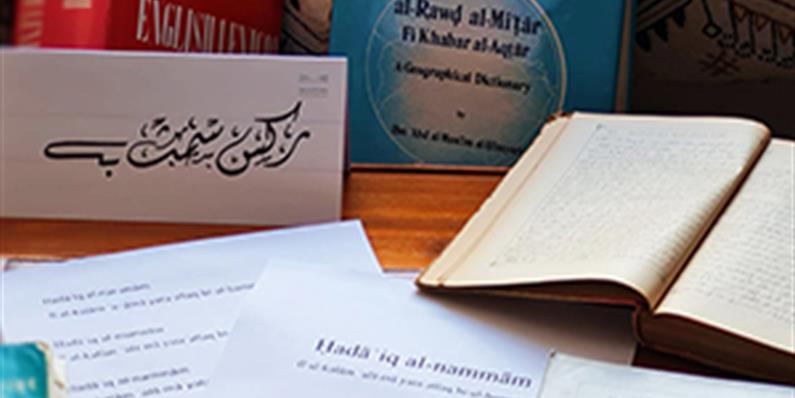Subscribe
to receive news by email
Subscribe
to receive news by email
Arabic 101
Arabic Word of the Day
Shami and Levantine Dialect
AraBIT
Arab Trivia
Arts and Architecture The Arab world laid the foundation for most of the arts and architecture we know today--the pyramids of ancient Egypt, for example, were tremendous feats...
Read More
Copyright © 2025 Arab America
Go topOnline short course on \"Arabic Tranliteration for Academics, Publishers and Librarians

Date/Time
Date(s) - 12/05/2024 - 12/12/2024
2:00 pm - 4:00 pm
Categories
Cost:
USD
Contact Person:
Email:
shortcourse.ismc@aku.edu
Website:
https://www.eventbrite.co.uk/e/arabic-transliteration-for-academics-publishers-and-librarians-tickets-946568972277?aff=oddtdtcreator
Phone:
Organization:
Aga Khan University (International) in the United Kingdom
About this event
AKU-ISMC’s new Centre for the Languages of the Muslim World is delighted to offer this short course as part of its Professional Development series. Arabic Transliteration for Academics, Publishers and Librarians is aimed at professionals, scholars and students who work with Arabic text and would like to acquire knowledge of transliteration systems and gain or improve their practical transliteration skills under the guidance of experienced tutors.
The course is a 5-hour practical workshop-style course taught in two highly interactive sessions. Both sessions incorporate tailored feedback from the tutors.
In session I, participants will learn about transliteration and transcription, the various conventions and scholarly traditions, linguistic issues, contextual needs, and specific problems of Arabic-to-roman rendering; participants will learn and practice contextually appropriate practical transliteration with tailored feedback from the tutors. Session II will comprise a “problem clinic” workshop focused on short sample texts chosen by each participant and submitted in advance. During the course, consideration will also be given to issues of bias and ideology.
The course is equally well suited to native and non-native speakers of Arabic.
Aims of the course
- Develop an understanding of transliteration and transcription, linguistic issues, contextual needs, and specific problems of Arabic-to-roman rendering.
- Familiarisation with the various conventions and scholarly traditions
- Practice contextually appropriate practical transliteration with tailored feedback from the tutors
Course Leader
Dr Alex Bellem is a linguist Arabist and assistant professor at AKU-ISMC, where she leads the development of the institute’s new Centre for the Languages of the Muslim World. She specializes in comparative–theoretical phonology (& phonetics) and Arabic dialectology, with expertise in the languages & linguistics of the Middle East and contiguous regions. She collaborates with Rex Smith in a project on the language of texts composed in Literary Mixed (“Middle”) Arabic. She has previously collaborated on projects on the Modern South Arabian languages Mehri and Sheret (Jibbali). She has broader research interests in folk literature and in cultural heritage and has also published on Iraqi folk poetry. She has held academic posts at Durham University, Salford University, and the CBRL British Institute (Amman & Damascus), and at these institutions, as well as SOAS, she has gained extensive experience teaching linguistics, Arabic translation, and Arabic language. She holds a PhD in Arabic Linguistics from SOAS, an MA from UCL (Linguistics), and a BA from Manchester University (Turkish & Arabic).
Course Co-facilitator
Professor G. Rex Smith is Professor Emeritus at the University of Manchester and was most recently a Visiting Professor in the School of Languages, Cultures and Societies, University of Leeds (2014 – 2020). He has taught and researched the Arabic language and culture for many years and has held academic posts at the universities of Cambridge, Durham, Manchester, and Leeds. He has published widely on (classical and “Middle”) Arabic, Yemeni history and culture, and Middle Eastern travel literature (both Arabic and French). Much of that research has involved translations from Arabic, perhaps most significantly, his 2008 annotated translation of the 13th-century journey of Ibn al-Mujāwir, A Traveller in Thirteenth-Century Arabia. Among many other publications, Professor Smith co-authored a book on the Arabic scripts, A Brief Introduction to the Arabic Alphabet (with John F. Healey, Saqi Books, 2009). His two current projects are translations of the travel writing of the French littérateur Pierre Loti (Gerlach Press, 2021, 2022), and collaborative work with Alex Bellem on a comparative study of linguistic features of Literary Mixed (“Middle”) Arabic. He has a BA from SOAS in Classical Arabic, and an MA and PhD from the University of Cambridge.
Date and time
5 December | 14:00 – 17:00 (London time) 12 December | 14:00 – 16:00 (London time)
Eligibility Criteria
The course assumes full reading ability of the Arabic script and at least some basic knowledge of or working familiarity with the Arabic language. It is equally well-suited to native and non-native speakers of Arabic.
Note
The course will be delivered via Zoom. Readings and further details will be provided later upon registration.
This course will not be recorded.



